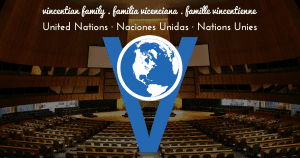A number of years ago, my sister, a critical care nurse with a prominent Home Health Care Agency, wrote a piece for a local newspaper about care for homebound patients. She called it “Who’s the Boss,” cleverly sharing the name of a then-popular TV SITCOM.
Her point was that patients must have a say in their treatment protocol if it is to be successful. That care-givers must listen to patients and take their opinions seriously, instead of an instinct a trained professional might have to simply decide what must be done, and how. After all, he or she is the expert here and what was all that schooling for?
I thought of this recently while reading Street Homelessness and Catholic Theological Ethics, co-edited by Mark McGreevy who chairs the Vincentian Family’s Homeless Alliance (FHA). The Alliance is the unique common project of the 160 branches of the Family of St. Vincent de Paul, the Universal Patron of Charity for the Catholic Church. The Family currently serves in 156 countries.
Expecting chapters filled with calls for advocacy and structural change to eliminate systemic homelessness as a necessary component to end poverty, the first section speaks of “encountering and accompanying” the homeless as part of a “revolution of tenderness” that Pope Francis calls for. It went on to talk about Empathy, Humanity and Hospitality.
My first thought was “oh no, please don’t overly spiritualize a critical social problem.” Like offering “thoughts and prayers” following yet another shooting incident, without any effort to deal with the issue concretely.
How wrong can one be? I had momentarily forgotten what St. Vincent taught us: that it’s not only about doing good in the world, but doing it well. As he said about feeding the hungry, give them bread and soup, but also give a cup and spoon and even a napkin, so they can eat with the dignity they deserve.
Challenging systemic homelessness, indeed all forms of the poverty that dehumanizes so many, is rightfully the goal. But it’s also necessary to begin with the right method by “listening and accompanying” because how we go about change is critical.
Many of us have learned that true and lasting change of the systems that entrap so many in poverty comes from the bottom up, not top-down. Not from those in powerful positions, not from governments. Poverty, including homelessness as one key component, cannot be erased by decrees and it certainly will not come from political promises. It will come from the victims of injustice, from the people who suffer the problem, who are the real “experts” on the issues. They must be heard, they must be involved, and they must act. But they will not unless approached, listened to, accompanied and taken seriously.
The authors of chapter one give powerful testimony about their encounter with the homeless. Doing street outreach they found is not primarily about giving help but building relationships. Not developing new social circles or replacing one’s friends, but developing friendly relationships of trust and respect with those experiencing homelessness. One description later in the book summarizes it beautifully:
“It all begins with one-on-one, human-to-human connections. It doesn’t come about when the person of relative privilege seeks to save or change the person who is suffering. Instead, there must be a deep listening for the words, the dreams, the hopes that are already within the individual.”
That kind of listening does not come easily to most of us now with limited attention spans and 24/7 information overloads. But if we engage in the process of true accompaniment, both persons may be significantly and positively changed. Maybe even “converted” in the Vincentian way: we evangelize and serve the poor and are ourselves converted in the process.
This is the “culture of encounter” Pope Francis speaks of. It’s the Beloved Community of Martin Luther King Jr. It’s a slice of the Kingdom of God we’re supposed to build on earth.
It means no one is home until everyone has a home. It means authentic listening to the real experts here. And how we get there depends on how we start.
Jim Claffey
UN NGO Congregation of the Mission representative
Addendum: Concerned about homelessness? Visit www.vfhomelessalliance.org to learn more or to join the “13 houses” campaign.






On point from beginning to end. Thanks
Beautiful! To listen, to learn, to bring about just solutions. Thank you, Jim
Jim, you point out what we see at the UN–that persons who are or have experienced homelessness are the true experts; the ones with the most practical and effective solutions. Thank you for the great article!
This article really touched me Jim. Thank you very much.